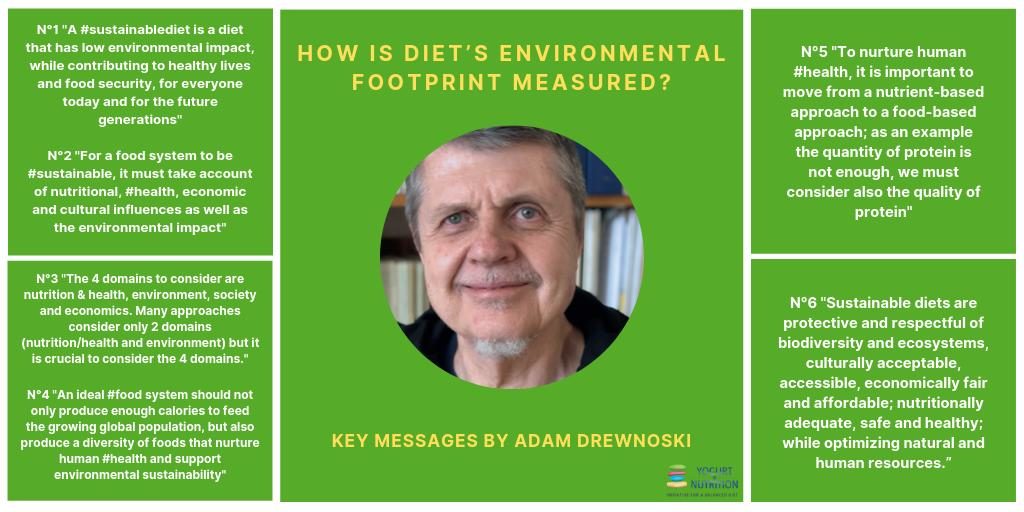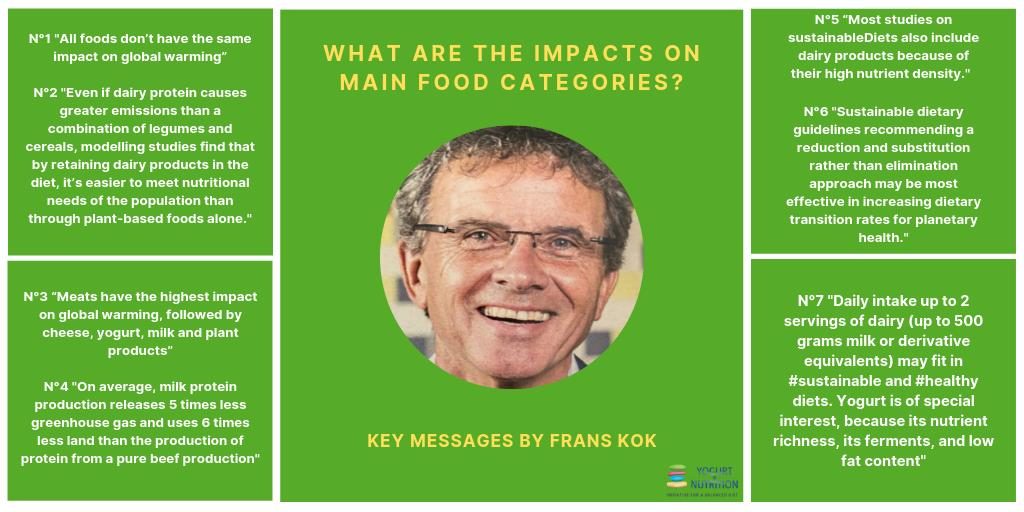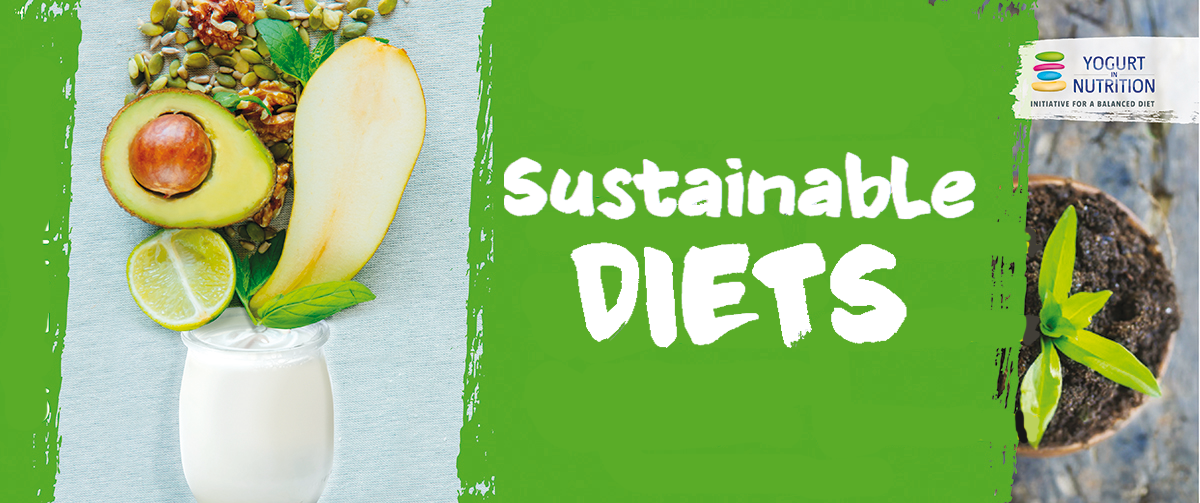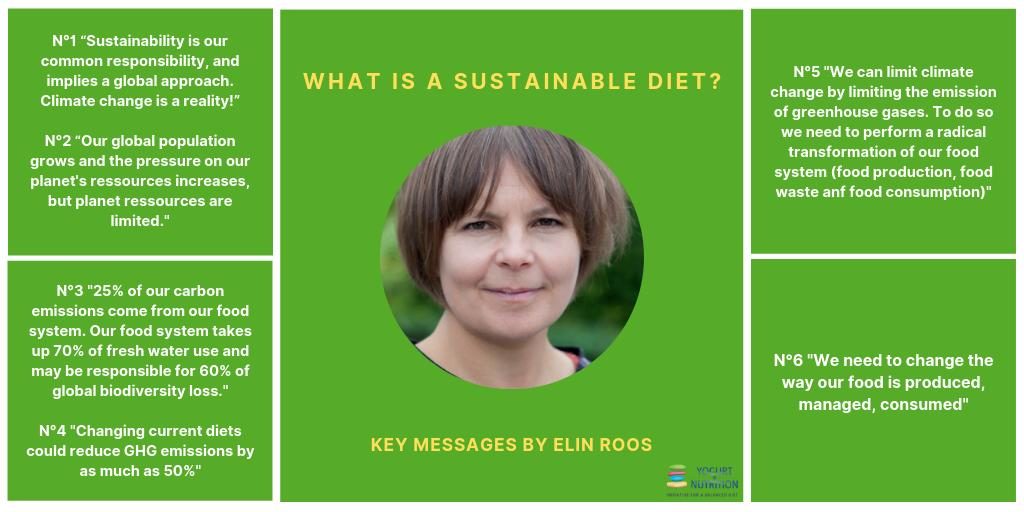Which diets are the most sustainable? How is sustainability measured? Does a sustainable diet always imply to avoid animal-based products? Are dairy & yogurt part of sustainable diets? Those are some of the questions that Elin Röös (Associate Senior Lecturer, Department of Energy and Technology, Swedish University of Agricultural Sciences), Adam Drewnowsksi (PhD, Director, Center for Public Health Nutrition, University of Washington) and Frans Kok (Professor emeritus, Wageningen University, the Netherlands) have adressed on the YINI Symposium organized on Monday 10th of June, during Nutrition 2019, in Baltimore, USA.
Sustainable diets: myth or reality?
Early this Monday morning, the conference room of Nutrition 2019 is packed. In front of the assistance, the conference begins with Elin Röös (Swedish University of Agricultural Sciences, Sweden), on a screen*, who details the different issues and implications of potential sustainable diets on food systems, food production, nutrition…
According to the recent data, the rapid decrease in GHGE (greenhouse gas emissions) is needed as we are pushing the problem on coming generations. Current food systems are a main contributor to climate change, responsible for up to 25% of GHGE and leading cause of biodiversity loss, freshwater use and pollution. Farming, inputs, land use are responsible for about 15 to 25% of global GHGE and packaging, processing, markets, home use and waste are evaluated to contribute to 5 to 10% to global GHGE. On the nutrition aspects, food systems also fail to feed people adequately with massive malnutrition around the World (hunger, obesity, micronutrient deficiency).
Based on this data, how to build sustainable diets?
According to the FAO: “Sustainable diets are those diets with low environmental impacts which contribute to food and nutrition security and to healthy life for present and future generations. Sustainable diets are protective and respectful of biodiversity and ecosystems, culturally acceptable, accessible, economically fair and affordable; nutritionally adequate, safe and healthy; while optimizing natural and human resources.” (FAO/Biodiversity International, 2010).
If the domains of sustainability can be defined as health, economics, society and the environment, the ideal sustainable food supply should need to produce foods that are nutrient-rich, affordable, socially acceptable and appealing – and with low impact on the environment.
In high-income settings, access to healthy foods is usually good. However, Western diets and high quantity of animal-sourced foods, cause high environmental impacts. In this context, more plant-based diets have been proposed as an interesting option. However, it remains difficult to evaluate which types and amounts of animal-based foods (meat and dairy) to promote in order to reach sustainability.
The key messages by Elin Röös:
- Climate change is a reality! Sustainability is our common responsibility, and implies a global approach.
- Up to 25% of our carbon emissions come from our food system. Our food system takes up 70% of fresh water use and may be responsible for 60% of global biodiversity loss.
- Changing current diets could reduce GHGE by as much as 50%. We need to change the way our food is produced, managed, consumed
- Production’s improvements, technical innovations, reduction of food losses and waste, changes in consumption are the required changes to make food systems sustainable
How the environmental footprint is measured?
Adam Drewnoswki (University of Washington, USA) came enriching the pondering with a presentation of the methodology approach and the recent research data.
Sustainable diets is defined in 4 dimensions : Nutrition and health (energy and nutrient density, nutrient profiling, diet quality), Economic (affordability, cost per Kcal or nutrient, budget, labor issues), Society (cultural importance, social identity, attitudes, beliefs, concerns, religions, rituals) and Environment (environment cost, GHGs, land, water, energy, soil, climate, waste, loss).
However, these 4 domains are evolving with time and space; so do diets. The way to measure sustainability is then very complex and sharp. Adam Drewnowski compared it to a jewel!
It is important to keep in mind that foods need to be nutrient-rich, affordable, accessible, and appealing – as well as safe, and (increasingly) natural, and with low impact on the environment.
Each of the sustainability domains has its own metrics and measures:
- Nutrient density is measured using nutrient profiling (NP) tools.
- Affordability can be measured in terms of energy or nutrients per unit cost,
- The social value of foods is more complex to measure and include attitudes and beliefs, perceived pleasure and social context of eating.
- Environmental impact of diets is measured in terms of land, water and energy use associated with food production, distribution and retail. When focusing on carbon footprint, environmental impact of foods is often expressed per kg of food weight where it ought to be expressed per 2000 kcal/day or per nutrient.
In synthesis, for Adam Drewnowski:
- For a food system to be sustainable, it must take account of nutritional, health, economic and cultural influences as well as the environmental impact
- The four domains to consider are nutrition & health, environment, society and economics. Many approaches consider only two domains (nutrition/health and environment) but it is crucial to consider the four domains and their evolution.
- An ideal food system should not only produce enough calories to feed the growing global population, but also produce a diversity of nutrient-dense foods that nurture human health and support environmental sustainability
- The need for new metrics is clear: to adjust Nutrient-Rich-Food Index (NRF) for protein quality and to express GHGEs per kcal or nutrient.

Is there still place for dairy products?
Following this presentation on the importance of protein quality in sustainable diet, Frans Kok (Wageningen University, the Netherlands), focused on the dairy products.
According to the Eat Lancet paper, published early this year, specific schifts are needed (dietary shifts, production practices evolution, reduced food waste) to stay within food production boundaries and still deliver healthy diets in 2050 (predominanlty plant-based).
Analysing the studies available, mostly country-specific, F. Kok showed that most of the results indicate that dairy are part of sustainable diets. Meats have the highest impact on global warming, followed by cheese, yogurt, milk and plant-products. Even if dairy protein causes greater emissions than a combination of legumes and cereals, modelling studies find that by retaining dairy products in the diet, it’s easier to meet nutritional needs of the population than through plant-based foods alone.
In synthesis, according to Frans Kok, reductions in GHGE of 20-30% through our diet by 2030 are achievable to limit global temperature rise to below 2°C (cf. Paris Climate Agreement) and the EAT LANCET report is recommending a health planetary plate composed at 50% by plant-based foods, a high reduction of meat & a limitation of dairy products. But this should not be the unique solution.
For Frans Kok:
- Existing data show that a daily intake of milk or derivative equivalents still fits in sustainable and healthy diets, with a special interest for yogurt because of its nutrient richness, low fat content and vehicle of ferments.
- However, more studies are necessary to quantify its environmental impact.

For all speakers, the need for further studies and adequate metrics is obvious. It is also clear, that sustainable diets can be built by different models and that local dietary habits and eating cultures should be the basis for successfull changes. Finally, the recommendation of reduction and substitution of some foods rather than a complete elimination approach may be more effective for planetary health.
* In order to limit her carbon footprint, Elin Röös has decided to be online and avoid the plane trip from Sweden.




